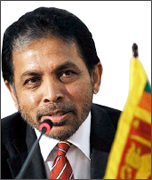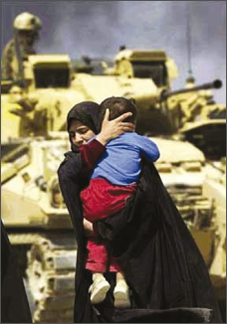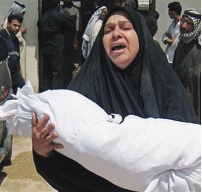NAM stands by Sri Lanka
UNSG’s decision to appoint advisory panel:
by Manjula FERNANDO
|

Dr. Palitha Kohona
|
|

Maged A. Abdelaziz of Egypt
|
Last week the Non-Aligned Movement (NAM), the largest regional bloc
representing two thirds of the UN membership, backed Sri Lanka in its
outright rejection of the UN Secretary General (UNSG) Ban Ki-Moon’s
intended advisory panel on Sri Lanka.
In a strongly worded letter addressed to the UNSG, Egyptian Permanent
Representative in New York Maged A. Abdelaziz, the current chair of NAM
said, “the Non-Aligned Movement strongly condemns selective targeting of
individual countries, which it deems contrary to the founding Principles
of the Movement and the United Nations Charter.”
Ban Ki-Moon, in a letter dated February 25, 2010, conveyed to
President Mahinda Rajapaksa his intention to appoint an expert panel to
advise him ‘on the way forward’ on accountability issues stemming from
alleged human rights violations during the final operations against LTTE
terror.
The unanimous decision by the Non-Aligned Movement’s 118 Members is
seen as a major diplomatic victory for Sri Lanka by UN observers.
Sri Lanka’s Permanent Representative to the UN Dr. Palitha Kohona
briefed the Sunday Observer of his address before the regional coalition
where the Members upheld Sri Lanka’s stance.
In a speech at the NAM Coordinating Committee meeting on March 9 at
the UN Headquarters, Dr. Kohona warned, “this development could have
serious implications for us all”.
He said the Member States needed to act if the Secretary-General,
whose responsibility is to engage with its Members, were to appoint
advisory panels selectively on Member States against their wishes. “This
will set a precedent that will be difficult to manage”.
He added “We, in the NAM, endorse the International Bill of Human
Rights and believe that there should be no impunity for violations of
International Law. My country supports this position and will do
everything necessary to address accountability issues through domestic
processes.
Sri Lanka has a mature domestic legal structure which is quite
capable of managing issues of this nature without outside interference.
We strongly object to unilateral initiatives of this nature by the
Secretary-General”.
In conclusion Dr.Kohona requested the NAM Chair to write to the
Secretary-General on Sri Lanka’s behalf and convey the concerns of this
Movement to the proposed action by the Secretary-General.
The NAM Chair in his letter added, “I would like to convey the Non-
Aligned countries’ deep concern about the announced intention to appoint
a Panel of Experts to advise on accountability issues relating to Sri
Lanka, which comes as a reaction to proposals by the United Nations High
Commissioner for Human Rights that are based on information that does
not take into account the particularities of the domestic situation, and
without consultation with the Government concerned.”
President Mahinda Rajapaksa flatly rejected the move by Ki-Moon to
appoint this ‘ad-hoc’ panel, in his telephone conversation with the
latter on March 4. He stated ‘Sri Lanka looked forward to treatment as
per the United Nations Charter that provides for equal treatment to all
members of the UN, while respecting the principle of non-interference in
the internal matters of States.’
Internal matter
A senior official from the Colombo UN office told Sunday Observer the
Secretary General cannot act unilaterally involving an internal matter
of a Member country without the consent of the UN Security Council or
the General Assembly. Therefore, this action amounted to a breach of the
UN mandate.
Similar advisory panels on Nepal, Guatemala and Cambodia were
sanctioned by the Security Council. A UN Commission to probe the
assassination of former Prime Minister Benazir Bhutto was initiated
following requests from Pakistan.
The NAM Chair has also pointed out: “Neither the Security Council nor
the General Assembly or its subsidiary Human Rights Council, has made
pronouncements on alleged human rights violations in Sri Lanka or
mandated any particular course of action. The situation in Sri Lanka is
not on the agenda of any of these bodies, and there is nothing in the
Charter of the United Nations that authorises intervention in matters
which are essentially within the domestic jurisdiction of any State”. In
fact Sri Lanka crushed a move by the Western bloc to defeat Sri Lanka at
a special Security Council session in May 2009, shortly after the war
against LTTE terror ended.
Almost two thirds of the Security Council membership supported Sri
Lanka at this special session and upheld that the country should be
assisted in its post-war rebuilding efforts.
Further, the Non-Aligned Movement has firmly opposed unilateral
evaluation and certification of the conduct of States, as proposed by
Ban Ki-Moon’s advisory panel, as a means of exerting pressure on
Non-Aligned and other developing countries.
The UN Head of Mission in Colombo has confirmed that he has not been
consulted by New York in their decision to appoint an advisory panel,
neither have they consulted the Government of Sri Lanka for their views.
If the Security Council did not ask for it, the General Assembly or
the Human Rights Council did not want it, the question remains as to who
wants an advisory panel on Sri Lanka on accountability issues.
A Foreign Ministry official said a powerful Western country and
certain INGOs were behind pressurising the UNSG into taking such
unwarranted action.
The senior official said never in history has there been a unilateral
decision on the part of the Secretary General to appoint an advisory
panel of a similar nature which amounts to intervention in the internal
matters of a sovereign nation.
INGO resources for LTTE
During the final phase of the operations in Kilinochchi and
Mullaitivu the military forces uncovered evidence of how INGO finances
and resources meant for civilian welfare ended up with the LTTE and how
their funding was funnelled to already overflowing LTTE coffers. The
LTTE, though defeated internally, largely remains intact overseas. Its
remnants through various fronts propagate the separatist agenda of the
LTTE.
Terrorism experts warn that with its still intact reserves
accumulated through illegal means such as drug trafficking, gun running,
human smuggling and credit card scams over so many years, they could be
in a position to buy in and buy out politicians of even powerful
nations, as per their wish. A senior State official said, the UN Chief
has intended appointing an advisory panel on Lanka despite the fact
there is a global outcry on the UN to probe war crimes charges against
the US and the UK for their actions in Iraq and Afghanistan.
“The action of the UN Secretary General is unprecedented in the
backdrop of funeral processions and wedding parties being bombed by
Drones, killing hundreds of innocent civilians.”
Further, Sri Lanka has never been charged for humiliating, raping or
inhuman torture of prisoners of war in detention camps like Abu Ghraib,
Guantanamo, or Bagram.
It is interesting to note the two reports published below:
Top UN official accuses US of inhuman ‘atrocities’ in Iraq,
Afghanistan
Fox News, March 4
 A top UN official accused the United States of committing inhuman
“atrocities” in Iraq and Afghanistan during a speech Wednesday to the UN
Human Rights Council in Geneva. A top UN official accused the United States of committing inhuman
“atrocities” in Iraq and Afghanistan during a speech Wednesday to the UN
Human Rights Council in Geneva.
“The aggressions against Iraq and Afghanistan and their occupations
constitute atrocities that must be condemned and repudiated by all who
believe in the rule of law in international relations,” said UN General
Assembly President Miguel d’Escoto Brockmann.
D’Escoto claimed that US actions have directly led to more than a
million Iraqi civilian deaths since 2003, a vastly inflated figure that
does not correspond with the UN’s own estimates.
The UN’s health and medical agency, the World Health Organization,
says 151,000 Iraqis have died since the 2003 invasion. IraqBodyCount.org
puts the death toll between 90,000 and 99,245. D’Escoto’s fiery speech
came on the day the Obama administration decided to take up observer
status on the Human Rights Council, which the Bush administration had
boycotted because it was unable to crack down on despots and human
rights abuses.
D’Escoto urged the Council to put the human rights situation in Iraq
on its agenda, accusing the US of war crimes and a series of human
rights violations. “These must be addressed to bring an end to the
scandalous present impunity,” he said. |
| Excerpts from an article written by George Monbiot in the Guardian,
UK on January 25, 2010, under the title ‘Wanted: Tony Blair for war
crimes. Arrest him and claim your reward’
 Under the United Nations Charter, two conditions must be met before a
war can legally be waged. The parties to a dispute must first “seek a
solution by negotiation” (article 33). They can take up arms without an
explicit mandate from the UN Security Council only “if an armed attack
occurs against [them]” (article 51). Under the United Nations Charter, two conditions must be met before a
war can legally be waged. The parties to a dispute must first “seek a
solution by negotiation” (article 33). They can take up arms without an
explicit mandate from the UN Security Council only “if an armed attack
occurs against [them]” (article 51).
Neither of these conditions applied here. The US and UK Governments
rejected Iraq’s attempts to negotiate. At one point the US State
Department even announced that it would “go into thwart mode” to prevent
the Iraqis from resuming talks on weapons inspection. Iraq had launched
no armed attack against either nation.
We also know that the UK government was aware that the war it
intended to launch was illegal. In March 2002, the Cabinet Office
explained that “a legal justification for invasion would be needed.
Subject to law officers’ advice, none currently exists.”
In July 2002, Lord Goldsmith, the Attorney General, told the prime
minister that there were only “three possible legal bases” for launching
a war - “self-defence, humanitarian intervention, or UNSC [Security
Council] authorisation. The first and second could not be the base in
this case.” Bush and Blair later failed to obtain Security Council
authorisation.
As the resignation letter on the eve of the war from Elizabeth
Wilmshurst, then deputy legal adviser to the Foreign Office, revealed,
her office had “consistently” advised that an invasion would be unlawful
without a new UN resolution. She explained that “an unlawful use of
force on such a scale amounts to the crime of aggression”.
|
|

